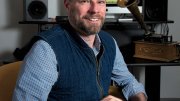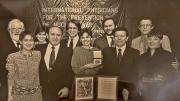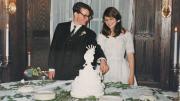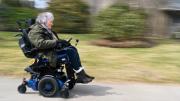The son of a dentist and a psychologist, Peabody professor of music Alexander Rehding thought he’d end up in the medical field. After finishing high school in Germany, he worked in a home-care center—a way to serve his country in lieu of required military service—and realized that field was not for him. Eager to study abroad, he applied to the University of Cambridge. Russian was his favorite subject, but he figured studying it in England would be strange. “And so, I thought, ‘Music isn’t bad!’” He was a trombonist and pianist, but didn’t know much about Cambridge’s world-renowned music program. “I was incredibly naïve.” To his surprise, he got in. The first three years presented a rigorous and narrow view of music theory, but when he returned for a master’s, everything opened up. “It was sort of this flood of new stuff that I was confronted with that I had no idea existed,” he recalls. Moving to the United States after a decade in England continued the flood of ideas, including the concept of American football. He met his neuroscientist husband at a Super Bowl party in 2004 after taking a position at Harvard. (They have two kids now, but still know nothing about football.) Though some would consider his work highly interdisciplinary, Rehding prefers to view music as a broad field, and says he’ll never be a specialist. He’s produced scholarship on ancient Greek and Egyptian music, Beethoven’s Ninth Symphony, and modern sirens. “I have a very short attention span,” he explains. “I get bored very easily.” He lets an interest percolate in the background until he feels compelled to write about it. “I’m super excited about whale song at the moment,” he says. “I don’t know where that’s going to take me.”
Alexander Rehding

Alexander Rehding
Photograph by Stu Rosner
You might also like
The 2025 Pulitzer Prizes Announced
Winners across five categories, from commentary on Gaza to criticism on public architecture
Doctors for Change
Countway Library exhibit explores historic anti-nuclear activism
Rendering Dreams in Art
South Korean artist’s socially themed photographs at the Peabody Essex Museum
Most popular
Explore More From Current Issue
Why Men Are Falling Behind in Education, Employment, and Health
What to do as men and boys fall behind
A Harvard Love Story in Poetry
Young love: the poem, plus enduring lessons from a public-health pioneer
Addressing Gaps in Care for Patients with Disabilities
Lisa Iezzoni explores the unmet needs of patients with disabilities.







